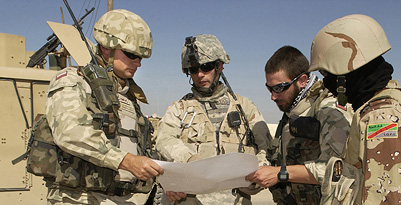
Is the Pentagon starting to reverse its support of Don’t Ask, Don’t Tell? In a telling article in this month’s Joint Force Quarterly, Air Force Colonel Om Prakash asserts, “after a careful examination, there is no scientific evidence to support the claim that unit cohesion will be negatively affected if homosexuals serve openly.”
The article, The Efficacy of Don’t Ask, Don’t Tell, was published after winning the 2009 Secretary of Defense National Security Essay competition and approval by the Chairman of the Joint Chiefs of Staff Admiral Mike Mullen.
While Mullen’s spokesperson cautioned “there was no intention… to send any subliminal message to the force or the country,” some civil-military researchers are already claiming the move reflects a “seismic shift in military opinion on the gay troops issue…. that even people inside the Pentagon are increasingly critical of the policy and are willing to air [it] publicly.”
The debate is surely making fresh waves given the whirlwind of publicity the article attracted – with features in the Boston Globe, NYTimes, Salon, NPR, CBS, and WashPost.
Last week the BBC aired the story of Lieutenant Colonel Victor Fehrenbach, who is currently being discharged from the Air Force under Don’t Ask Don’t Tell (DADT) after nearly twenty years of service. He is fighting the decision in the hope that President Obama will overturn the policy before he’s officially fired.
He’s not the only one asking when Obama intends to fulfill his campaign promises. On Sunday, former Atlantic Council Chairman and National Security Advisor General James Jones fielded the same question on CNN. “[The President] intends to [work towards repealing DADT] at the appropriate time and has already signaled that to the Defense Department,” Jones confirmed. “They are doing the things they have to do to prepare.”
Meanwhile in Congress – the only venue where the matter can legally be determined – both the Senate and the House have been preparing for the issue. A hearing by Armed Services Committee Chairman Carl Levin is being scheduled in the Senate this month, ahead of an expected bill meant to overturn the ban.
On Tuesday, Congressman Patrick Murphy held a special order to discuss the House version of the bill, the Military Readiness Enhancement Act of 2009, which currently has more than 175 co-sponsors (albeit one sole Republican, Rep. Ileana Ros-Lehtinen). He’s no stranger to the fight. The only Iraq War veteran in Congress, Murphy famously rebutted concerns that homosexuals distract from military morale in last year’s hearing before the House Armed Services Committee. “How is it,” he rhetorically asked conservative lobbyists, “that American servicemen and women are less professional and less mission capable than service members of other foreign militaries?
The foreign militaries he’s referring to are, of course, our NATO allies who have for the most part removed such discriminatory polices from their forces. More than 20 of the 26 NATO nations – including Great Britain, France, Australia, Canada and Israel – already allow open service by gays and lesbians. Of these, nine nations have fought alongside American troops in Operation Iraqi Freedom and twelve have done so in Operation Enduring Freedom.
The Chairman of the Joint Chiefs of Staff when DADT itself was adopted, John Shalikashvili, confirmed as much in 2007:
24 foreign nations, including Israel, Britain and other allies in the fight against terrorism, let gays serve openly, with none reporting morale or recruitment problems. I now believe that if gay men and lesbians served openly in the United States military, they would not undermine the efficacy of the armed forces. Our military has been stretched thin by our deployments in the Middle East, and we must welcome the service of any American who is willing and able to do the job.
Prakash’s Joint Force Quarterly article clarifies further:
There are potential lessons to learn from other countries that have lifted the ban on homosexuals serving openly. There was no mass exodus of heterosexuals, and there was also no mass “coming-out” of homosexuals. Prior to lifting their bans, in Canada 62 percent of servicemen stated that they would refuse to share showers with a gay soldier, and in the United Kingdom, two-thirds of males stated that they would not willingly serve in the military if gays were allowed. In both cases, after lifting their bans, the result was “no-effect.” In a survey of over 100 experts from Australia, Canada, Israel, and the United Kingdom, it was found that all agreed the decision to lift the ban on homosexuals had no impact on military performance, readiness, cohesion, or ability to recruit or retain.
While NATO armies are coping just fine with diversity in their ranks, the Department of Defense has discharged over 12,500 trained soldiers, including 58 much-needed Arabic linguists, with an estimated cost of $363 million over the last ten years.
The latest signs that the US government is finally ready to debate the issue is welcome indeed. At a time of two wars, our country needs the best and brightest service members possible – regardless of their professed sexual orientation.
Andrew Kessinger, who interned with New Atlanticist during the Summer 2009 semester, is a graduate student pursuing a double degree in International Security at the Institut des Etudes Politiques in Paris (Sciences Po) and Columbia University (SIPA).
